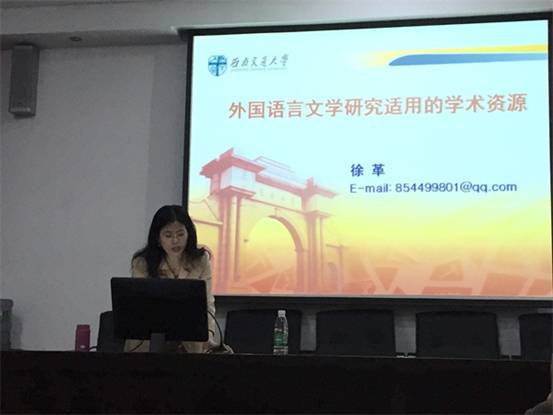The second lecture of the “Reading Salon for SFL Graduate Students” was held in the lecture hall on April 14th, 2015. Prof. Xu Ge, Secretary of SFL Party Committee, gave an informative lecture on “resources for academic research in foreign languages and literature”, which was indebted to her former position as the Party Secretary and Vice Curator of SWJTU library. Prof. Yu Senlin--assistant to Dean of SFL, presided over the lecture. Dr. Wang Junqi--Deputy Secretary of SFL Party Committee, and Dr. Tang Jun were present.

Prof. Xu Ge first introduced the basics in information retrieval, including how to effectively search within eight steps--defining the subject, identifying the resource, searching online databases, etc., how to get access to resources of different type and how to define the retrieval range. Then she narrowed down the resources to the free accessible electronic resources on SWJTU local area network, specifically the electronic resources on SWJTU library website and other available Internet resources.
As to the electronic resources of SWJTU library, Prof. Xu introduced the available databases in the following categories: Chinese periodicals, document resources in foreign languages, e-books in Chinese or other languages, abstract indexing, academic dissertation, themes, quotations. Taking CNKI—a Chinese full-text periodical database as an example, Prof. Xu explained how to analyze the retrieval results with group browsing which had been neglected by users. In addition, “New Oriental English Library for Multimedia Learning” and “Press Reader—A Global Newspapers and Periodicals System” were taken as examples of thematic databases, which impressed the present teachers and students with their amazing size and rich variety. At last, Prof. Xu, by carefully analyzing a certain classical paper, illustrated the audience how to search the related study on Internet through effectively reading the retrieval results.
When it came to the available Internet resources, Prof. Xu briefly introduced National Library of China, NetEase Open Course, Superstar Open Course, as well as accessible free dissertations websites and open academic institutional repository at home and abroad.
During the Q&A session, Prof. Xu offered some useful tips to increase the students’ accessibility to periodicals in foreign languages.